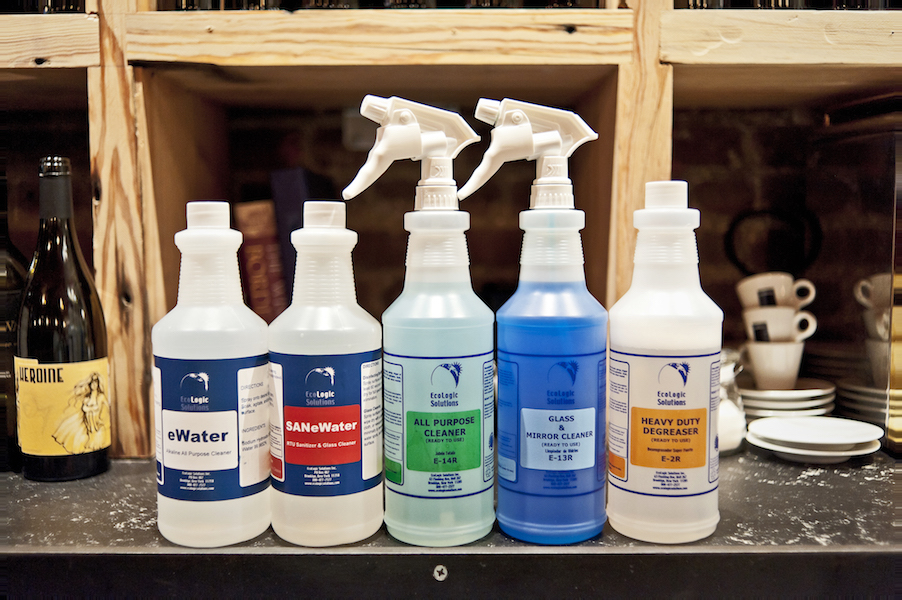Every entrepreneur has that “aha!” moment—an instant when a single, riveting business vision crystallizes. For Anselm Doering, the magical moment came in 2001, in a rest stop bathroom off I-87. The fluorescent glare illuminated a sign that read “Proud to be cleaned by Lysol.”
Anselm, who had run a pioneering green products store called Earth General in Park Slope in the 1990s, was shocked that anyone would be “proud” to use products that rely on harsh chemicals, when nontoxic plant-based compounds could do the job. So, on the spot, surrounded by porcelain and the scent of ammonia, he decided to start a green cleaning-products company.
Today his EcoLogic Solutions sells effective, earth-friendly cleaning supplies to companies including NBC and ConEd. Because good-food businesses are an obvious client base, Doering, a drummer who once dreamed of opening his own restaurant, has found an especially strong following among enviro-minded eateries from Bark Hot Dogs to Buttermilk Channel.
Most conventional kitchens use a noxious brew of detergents, rinse aids, drain cleaners, oven cleaners, disinfectants, toilet cleaners, bleach and sanitizers. Exposure to these substances—and even their fumes—can put kitchen staff at risk for skin and eye irritation or burns and breathing problems, according to the U.S. Occupational Safety and Health Administration. They’re no friendlier to the environment.
That’s why EcoLogic’s plant-based, biodegradable products—which include detergents, degreasers, glass cleaners, disinfectants and even a BioUrinal block infused with beneficial bacteria—are becoming as popular in city eateries as heirloom apples and heritage pork.
Take Franny’s. The owners put serious thought into every ingredient, so it only follows that they’d carefully consider their cleaning products, too—even listing EcoLogic on their “resources” page along with the farms that supply the restaurant. “We, as well as our employees and our own children, spend so much time in the restaurant that we would never want all the chemical exposure from conventional cleaning products,” says Francine Stephens, the restaurant’s co-owner and namesake.
Similar thinking landed EcoLogic a contract with Carroll Gardens locavore fave Buttermilk Channel. The restaurant gets raves for its duck meatloaf (the Times declared it one of the best dishes of 2011), but chef Ryan Angulo looks beyond the plate. “We use green cleaners at home and figured we should practice what we preach at the restaurant,” says Angulo. He considers performance, not just pollutants, and these products pass both tests: “They do the job really well,” he says, with the sparkling kitchen to prove it.
Bark Hot Dogs also says the products align with their values. Owners Josh Sharkey and Brandon Gillis use biodegradable packaging and offer beer in refillable growlers—so naturally they’ve used green cleaners from the start.
Other BK clients include Superfine, iCi, Bklyn Larder and Blue Marble ice cream. But the company is especially excited about a novel initiative across the river at Whole Foods. The supernatural supermarket is the first customer to try EcoLogic’s new on-site generation system, which creates super-effective cleaning products from simple tap water and salt. In a small kitchen at the Union Square Whole Foods, a machine the size of a Poland Spring dispenser passes salty water through an electrical charge, which essentially splits it into two new solutions: hypochlorous acid, a nontoxic disinfectant that studies have shown is up 80 times more effective than bleach (EcoLogic calls it SANeWater), and sodium hydroxide (or eWater), a mild detergent. The technology was invented two centuries ago in Japan, where they sometimes spray sushi with electrolyzed water to keep bacteria at bay, but remains little known in this country. Doering, ever the showman, does a double-demonstration on sales calls: He shows how well SANeWater cleans up greasy surfaces—and testifies to how safe it is by drinking it straight. “We freak them out every time,” he laughs.
Whole Foods installed the system a year ago, and the staff uses the electrolyzed water to clean and sanitize dishes, pots, pans and food-prep surfaces in its kitchen, and even to prolong the life of cut flowers. “It sounds a little more far out than it is,” says Tristam Coffin, a Whole Foods green mission specialist who is delighted with how well it works. “Any skepticism we might have had is out the window.” The on-site system, which cost $40,000, saves the store more than $4,000 a month, he adds, so it pays for itself in under a year.
Ironically, one of the biggest obstacles is convincing kitchen crews—the very group that stands to suffer ill effects from mainstream cleaners—that a clear, odorless alternative can do the job. Some expect suds—which in conventional detergents are created by petroleum. But Doering, armed with a $2 million investment from the Onondaga Nation, an Indian tribe near Syracuse known for its environmental stewardship, is ready to vanquish those misperceptions once and for all. The cash infusion allowed him to move the company from Kensington into new headquarters in the Navy Yard. The window shades, open to let in a glorious East River view, are made of recycled aluminum. A vertical garden takes up an entire wall in a trailer-like conference room. The EcoLogic delivery truck parked outside runs on vegetable oil. And the supply room has no overpowering odor, despite being crammed with cleaning products. From this verdant base, Doering has scaled up sales staff and begun selling in Los Angeles, San Francisco, Chicago, Michigan and Australia.
It’s a long way from the Lysol-scented restroom. “I’ve been jonesing for this moment,” says Doering.



